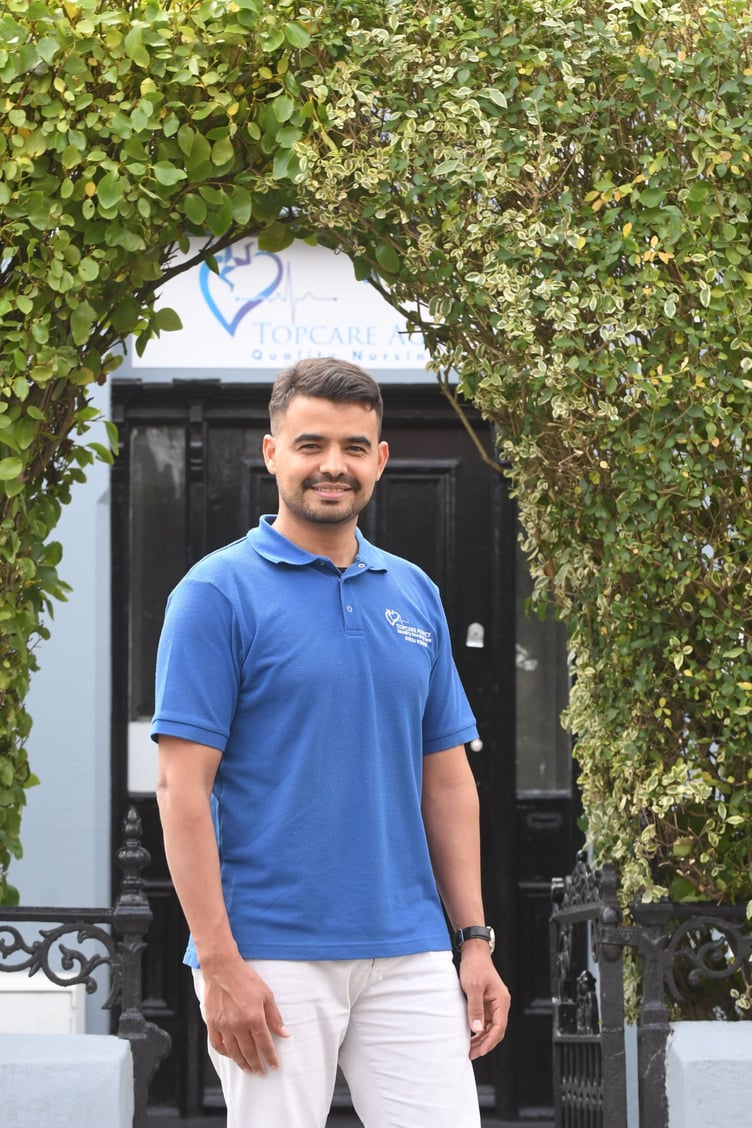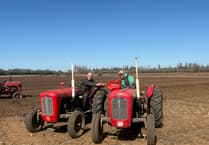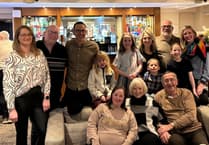You don’t choose where to be born but we can choose how to make a difference,’ says Sal Heddi.
This is something he understands better than most.
For the past seven years Sal has been happily settled in the Isle of Man, first working as an accident and emergency nurse at Noble’s then more recently running his own, highly-regarded nursing and domiciliary care agency, Top Care.
But Sal is not your typical entrepreneur: his is the story of a man born in a refugee camp who survived through a mixture of determination and his belief in the power of education.
Now that he has found success in the island he is sharing that gift of education by building a school to help others where he came from.
Just 100km, or a 40-minute plane ride, from the holiday playgrounds of the Canary Islands lies another world: Western Sahara, a country, or to be more precise, a disputed territory, which has been riven by war, oppression, human rights violations and extreme poverty.
Nearly five decades after the Spanish left what was their former colony, around 80% of Western Sahara remains under the control of its neighbour, Morocco. This includes virtually all of the country’s 1,000km Atlantic coastline and its phosphate mine, one of the richest in the world.
While Morocco has settled hundreds of thousands of its own citizens in this part of Western Sahara, the country’s own people, the Sahrawis, have been reduced to living in the remaining territory, which is mostly desert.
The Moroccans, supported by France, first invaded Western Sahara in 1976 and thus began a long and bloody war as the Sahrawis, with virtually no army or resources, tried to defend their country.
As Sal takes me through the tragic history of his homeland I realise that I knew nothing about any this.
Sal is not surprised but adds: ‘It still amazes me that we have internet but still some areas are completely hidden.’
And he goes on: ‘The Sahrawi people were forced to flee east, into the desert. They managed to run away: they were going to nowhere, just to be safe from the Moroccan army and bombs.
‘Many of them, they had to walk about 400km and they were bombed a few times with illegal weapons, including napalm. Then they were offered an area of Algeria called Tindouf, for the women and children to be safe them while the men kept fighting.
‘I was born during the war, in 1989, in the refugee camps in Tindouf. My dad was in the army, like all men: they just had to leave what they were doing and go to the army.
‘My mum was fighting for women’s rights: the educated people had to take back responsibility. If you knew how to write, you would be a teacher, that’s how it was. They were building a country from scratch.
‘When Spain left there were only nine people in Western Sahara who had a higher education – Spain did not invest much in education or infrastructure, they really focused more on taking the natural resources which was different to the British colonisation style where they built schools and there was certain level of integration.’
Many of the Spanish people, however, had great sympathy for the plight of the Sahrawis and they supported a number of programmes to help with the children’s health and education.
One of these saw a large group of 300 children taken to Spain each summer, to give them some respite from the temperatures in the desert which can reach up to 54 degrees and allow them to get medical check ups.
When Sal was seven he went to Gran Canaria on one of these programmes. It is a sign of just how vulnerable these children were that he was meant to stay there for two months but, unbelievably, they lost him.
To this day he still does not properly understand what happened, except that there was no one to meet his group at the airport. A family who were at the airport to meet their brother were asked if they would take a child and they said yes that was fine.
So Sal went to live in an isolated village in the mountains and there he stayed for nearly three years before the mistake was sorted out and he was returned to his parents.
He recalls: ‘I went to school there: I think I never really missed my family I was just happy I was having a great time I played football and I loved the Spanish food. But obviously my family had a very difficult time: they were very shocked because nobody knew what had happened to me.’
When came to his secondary education he managed to achieve one of the 10 best marks in the whole country which gave him the chance to go to school in Madrid. However, the travel documents and visa weren’t ready in time for the next school year and his father had other ideas regarding Sal’s education.
He says: ‘My dad was born in Timbuctoo and they have a culture that, to be a proper man, you have to go into the dessert and look after the animals and that year was a good year with rain so I went to an oasis and I was looking after animals, mainly camels and goats.
‘It wasn’t a safe area because there were some land mines and quite a lot of very dangerous poisonous snakes – it wasn’t pleasant at all but we had to do it.’
Luckily, after a year there his travel documents were sort out and he was able to go to Spain: ‘So I went to Madrid with my group of friends and we were kind of adopted by Spanish families.
‘I was 14 but I had very different priorities to the other children. They were like worried about the PlayStation, movies, and these kind of things and I was completely of a different mindset.
‘I was made a “proper man” too early.
‘I remember I was very determined to have a good future and I understood that, if you study you get a good future, and I was very happy to be in Spain, I was aware of the opportunity.’
He did a year of a medical degree, planning to become a doctor, but was unable to finance his course after that and studied nursing instead, at Madrid Autonoma University.
He goes on: ‘When I qualified, I went to do voluntary work back home, stayed there for a few months and then I went to the UK and started working in a nursing home in Hereford. After that I moved to work for the NHS in Guildford in the emergency department before working in different hospitals in London, mainly in critical care, A & E.’
Sal had done a course in advanced trauma care and that covered motorbike injuries and this led to him being asked to come to the island to help out during TT, just for two weeks.
He says: ‘After TT I was asked if I would like to stay on so I worked in Noble’s for about five years.
‘I was just very happy here: I settled very well and became a part of the Isle of Man family. Everybody was very good to me and I never had any problems.
‘I loved my job, I really did, and I felt that working here I was given the opportunity to do my job properly, which is something that when, you work in A&E in big hospitals across, you don’t have that chance. You have to try and survive day by day but here I did feel I was given the time to deliver good quality care to the patients.’
But Sal also had a long-term plan: ‘When I was in London I opened a small company and it took me some time to understand the market and how it works in the nursing sector.’
Finally, in 2019 he launched his Top Care nursing and domiciliary care agency. He now employs a team of 18 registered nurses and 27 carers: ‘This allows us to look after patients (adults and children) with complex care needs and it helps us to reduce hospital admissions.
‘At Top Care we also provide home care services for people island wide, such as dementia care, respite, companionship, wound care, injections at home, palliative care and more.’
The Top Care team can also carry out blood tests in a client’s home or work place and do intravenous therapy, including administering intravenous antibiotics. Sal has installed software which can give clients’ families (who may of course not be living on the island) access to detailed information about their relative in real time. This information can also be accessed by their doctor, consultant or district nurse.
He says: ‘As part of our transparency policy and person-centred approach, we invite our patients and their families to be involved in designing the care plan and to have access to the online care notes at all times, so they can see which carer or nurse is coming, what they’ve done, and for how long they stayed.’
And he goes on: ‘We know very well that patients should stay away from hospitals unless it is needed. Hospital settings are high risk for infections, people lose weight, they lose control of their daily life. At home when appropriate care is in place people recover better and quicker. Hospitals should be just a last resort or for procedures like an operation.’
A few years ago, Sal married Wahba and they now have two daughters, Farah and Galia.
‘We’re very, very happy here,’ he says.
He has done the Tough Mann Challenge and the Parish Walk to Peel and has discovered beautiful spots like Port Cornaa, but he still has one more dream he is determined to fulfil. He is building a school back home in Western Sahara and he is paying for it himself.
He says: ‘I’m very happy to do it, it was a dream for me. It’s going to be very focussed with three types of options: they can study to be an electrician, nursing care or do an IT course, and there will be a place for them to have breakfast, to encourage attendance.’
And he adds: ‘If I wasn’t in the Isle of Man it wouldn’t be possible. This island has given us so much, it’s been a safe place, and I want my children to be raised here.’

.jpeg?width=209&height=140&crop=209:145,smart&quality=75)
-with-his-business-partner-Michael-Fitzgerald.jpeg?width=209&height=140&crop=209:145,smart&quality=75)


Comments
This article has no comments yet. Be the first to leave a comment.